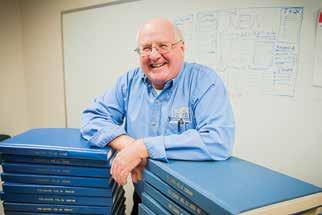
1 minute read
Don’t leave a bad taste behind
Mark My Words
FATHER MARK GOLDASICH

He repeated, “But I’m starved!”
Again, she replied, “Only one to a customer.”
Herter was normally a modest man but decided to now use the full weight of his office. “Madam, do you know who I am?” he said. “I am the governor of this state.”
She replied, “Do you know who I am? I’m the chicken lady. Now, move along, buster!”
(Adapted from a story in William J. Bausch’s “A World of Stories for Preachers and Teachers.”)
My mom worked for years for Pitko’s Catering in Kansas City, Kansas, and was “the chicken lady” at wedding receptions, dances and other functions. The first time through the buffet, Mom would gently remind guests that they’d get only one piece of chicken. While almost all were pleasant and understanding, there were always a few whiners. Although Mom unfailingly kept her cool, when she got home, she’d sigh and say, “Whew, dealing with the public!” She couldn’t understand how one piece of chicken was such an issue, when next to the chicken was barbecued brisket, then Polish sausage and kraut, and sometimes ham . . . not to mention Croatian potato salad, slaw, green beans, corn and scads of desserts.
This Sunday, May 21, is National Waitstaff Day and a perfect opportunity to ask how you behave toward those who serve food and drink. Since many folks go out to eat after a weekend Mass, would your server know that you’d just come from church by how you treat her or him? Or would they suspect that you’d been raised by feral wolves?
I loved going out to eat with my mom because she treated the servers with respect and a warm smile. She never let them go without a “thank you” when they refilled her Diet
Dr. Pepper or brought an extra napkin. She enjoyed complimenting their attentiveness and the food. And when the time came for the tip, she’d always say to me, “Give ‘em an extra couple of bucks!”
My mom acted this way because she knew what it was like to be on the “serving side.” She’d experienced the long hours, the aching feet, the lifting of heavy pans and plates, and the struggle to be polite in the face of rudeness. And Mom made sure that I learned those lessons. Rabbi Al Lewis once said, “Faith is about doing. You are how you act, not just how you believe.”
Whenever we leave the eucharistic table, let’s bring the respect and reverence shown there to the tables that we gather around, whether in a restaurant or at home.
And, if eating out, it’s always nice to “give ‘em an extra couple of bucks.”








